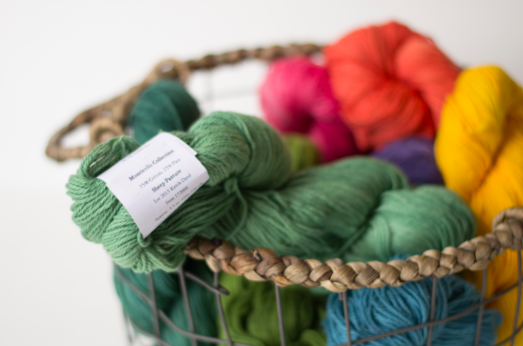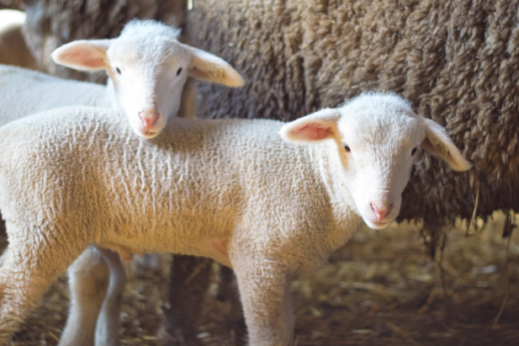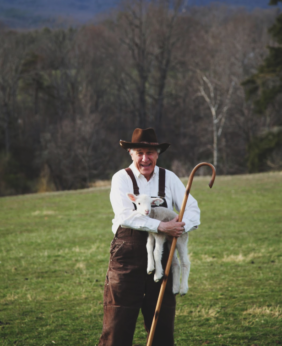Francis Chester-Cestari and family are here for all of your wool and lamb chop needs.
Francis Chester-Cestari’s business could be considered farm to closet. The Cestari Sheep and Wool Company doesn’t just farm sheep, shear them and mill the fiber for luxurious wool yarn; it also sells skeins to yarn shops and knitters in the United States, Canada, Europe and Asia and designs hats, gloves and blankets for the company’s textiles.
Chester-Cestari has been farming since 1946 — “at the age of 10,” he says — first in Long Island, New York, where he tended to a vegetable garden, milked goats and raised chickens with his family as a child. Shepherding is in his blood — his father’s family has been shepherds in Italy for generations — so it was only a matter of time before he ended up with his own flock.
Today, along with his wife, Diane, and his children and grandchildren, he is based in Augusta County, Virginia. It is a land of green — the family’s property of rolling pasture in Churchill, Virginia, is nestled between the George Washington and Jefferson National Forests and Shenandoah National Park — and possibility.
Ambition is part of Chester-Cestari’s fabric. As a teenager, he went to law school and got a degree as a backup plan in case he found farming to be too volatile. “But I always wanted to be a farmer, and I’m so pleased that, ultimately, I became one,” he says.
Today, as well as the wool part of his business, he sells and ships fresh, frozen lamb across the U.S. The lean, mild, sweet-flavoured meat he gets from his wool-bearing sheep are sold in packages of cuts, from loin chops and lamp chops to bone-in legs and stewing meat to ground lamb and heart for dogs. Each package comes with a recipe from Diane Chester-Cestari, too.
Ever the entrepreneur, Chester-Cestari continues to innovate. In the summer of 2017, he launched the Let’s Grow Sheep Together program, an initiative that allows people to purchase sheep from him and have the company sheer and buy the wool back. It will also buy progeny lambs that weigh more than 200 pounds.
“It’s something that I felt needed to be done because the sheep population has gone from 54 million in the early 1950s to 5.2 million today, with their numbers decreasing over the past 12 years in the U.S.,” he says. In essence, he adds, “It’s franchising.”
Because the program guarantees $3 per pound of raw wool and a backup market for lambs, as well as continual education and outreach for farmers, most of the sheep sold through the program to date have been to “non-sheep people,” says Chester-Cestari. His goal is to see 20,000 sheep sold through the program. Today, 200 have been purchased, and word is quickly spreading. Most sales have been small lots – “A dozen here, six there,” he says – but recently he’s had queries from two farms looking for 500 sheep each.
“The United States Department of Agriculture is telling existing sheep people that no one wants wool anymore, which is outrageous. I see a great future for natural fibers, as demand for them is growing very rapidly. The public seems to be getting tired of synthetic fibers.”
The Chester-Cestari farm opened its first wool mill in 1981, but 2019 will see the arrival of a second mill that will increase production by 400 percent, with the ability to process wool, cotton and cotton blends. “This is going to be the first wool mill built in the United States in generations,” he says.



You may want to clarify the ststement “This is going to be the first wool mill built in the United States in generations.” In the last 20-30 years, dozens of mini-mills have been built and opened for business. Without more facts, I am presuming that Mr. Cestari may be referring to building a large commercial operation. The smaller mini-mills are able to perform all the same processes as the larger mills – grading, scouring, picking, carding, combing, and spinning the fiber into yarn – but on smaller lots of fiber. [One advantage to a mini-mill is that some mills are… Read more »
Good for the Chester-Cestari farm for growing their business. I prefer wool to polyester and am willing to pay for it.
As a knitter I buy wool based yarns exclusively as do many other crafters I know. Not sure what USDA is thinking or where they are getting their information, but they are wrong!
There are several mills throughout the US that process wools, they are, I believe, considered small scale mills, it sounds as if this is going to be a larger scale mill maybe that is where they’re going saying it’s the first mill built in generations. I wish them much success wool is an amazing fiber!
Its a great way to market and develop a cottage industry. I am in N E Texas. I would like to raise a small flock. I need to study this…
Refreshing look at traditional proven methods that consumers are hungry to source and support
I spin for a hobby and wool is my favorite fiber to spin. I see many people who dislike synthetic fibers and have noticed its increasingly difficult to get 100% natural. Keep up the good work.
Not true. There is a wool mill in Fairbanks Alaska which as I recall, is in the United States.
Churchville* Va not Churchill. Where will the new mill be? His place in Churchville seems to have been vacant for a while now. I used to shop there fairly often when they were open.
There is a wool mill in Buffalo, Wy! Glad there will be another in VA. Best to all wool growers everywhere.